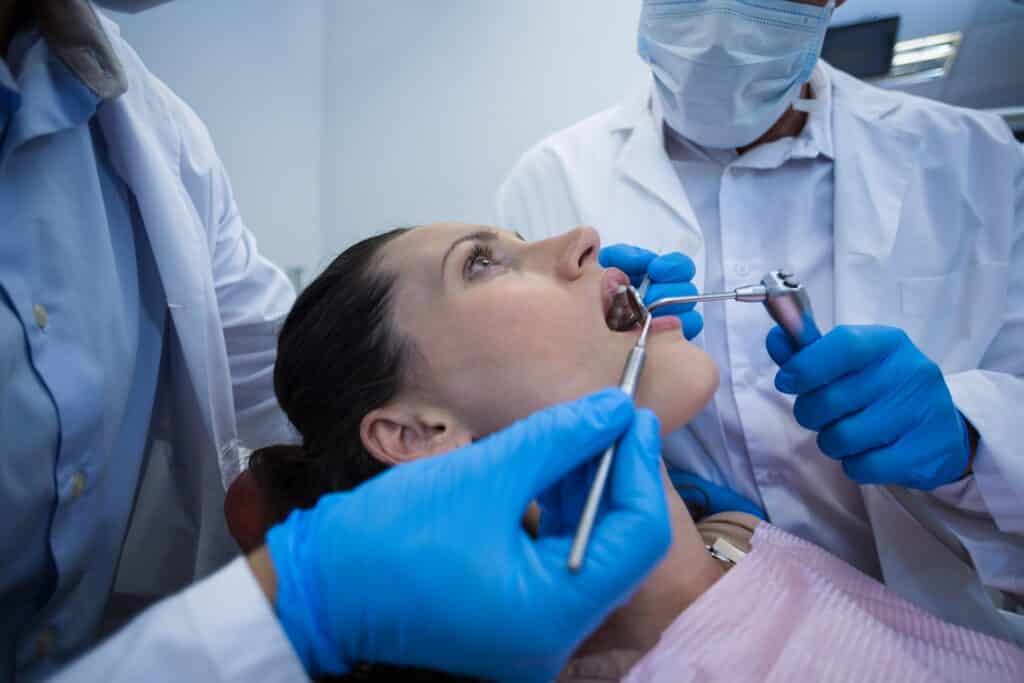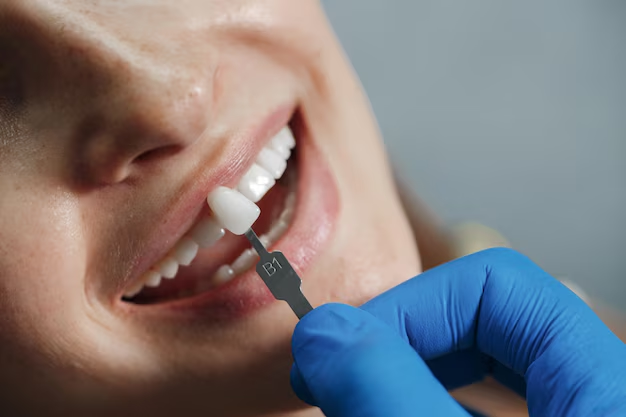When it comes to dental pain management, it’s crucial to understand how to effectively manage toothache until you can get an emergency dental appointment. Toothaches can be immensely discomforting, affecting our ability to eat, speak, and even sleep. Hence, knowing strategies for tooth pain relief becomes essential while awaiting a dental appointment.
Tooth pain can vary from mild discomfort to severe toothache, and it’s often a sign that something is wrong with your dental health. Emergency dental care can provide a definitive solution, but what should one do until the appointment? This blog post aims to shed light on temporary tooth pain solutions and coping methods to help manage the discomfort. From home remedies for tooth pain to understanding when an urgent dental treatment is necessary, we’ll cover various facets of immediate toothache management.
Stay tuned as we delve deeper into this topic, providing you with valuable insights on dealing with toothache and how to maintain oral pain management effectively. Whether you’re experiencing a mild annoyance or severe toothache relief, we’re here to help guide you through the pain until your emergency dentist visit. Remember, the information provided here is to help you manage the pain temporarily, and it’s essential to seek professional help for any tooth discomfort.

Understanding the Causes of Tooth Pain
Tooth pain can be an incredibly uncomfortable experience and understanding its causes can help you better manage it until your emergency dentist visit. Let’s delve into some of the common reasons that might be causing you this discomfort.
Tooth Decay: This is the most common cause of tooth pain. It happens when plaque, a sticky substance filled with bacteria, builds up on your teeth and eats away at the tooth enamel. This can lead to the formation of cavities which can cause pain and sensitivity.
Gum Disease: Also known as periodontal disease, this is another common cause of tooth pain. It’s caused by poor oral hygiene that allows plaque to build up and harden into tartar. The bacteria in tartar can cause inflammation and infection in your gums, leading to pain.
Tooth Abscess: This occurs when bacteria infect the dental pulp – the innermost part of the tooth that contains blood vessels and nerves. An abscess can cause severe pain and swelling, and is considered a dental emergency.
Cracked Tooth or Lost Filling: If you crack a tooth or lose a filling, the sensitive inner parts of the tooth become exposed, causing discomfort and pain. Urgent dental treatment is often needed to fix the problem and alleviate the pain.
Impacted Wisdom Teeth: Wisdom teeth are the last set of teeth to grow in. Sometimes, there isn’t enough space for them in the mouth, resulting in the teeth becoming stuck or “impacted”. This can cause significant pain and may require a dental procedure for relief.
Understanding these causes can help you in managing tooth discomfort and formulating strategies for tooth pain mitigation until you can receive professional dental pain management.
Immediate Remedies for Tooth Pain
Toothaches can be excruciating, and while it is essential to schedule an emergency dental appointment, there are immediate remedies that can provide temporary relief from the discomfort. Here are some strategies that you can use to cope with dental pain.
Rinsing with Warm Salt Water: This is a natural disinfectant and it can help to loosen food particles and debris that may be stuck in your teeth. It can also reduce inflammation and heal any oral wounds. To use this approach, mix half a teaspoon of salt into a glass of warm water, then swish the solution around your mouth for about 30 seconds before spitting it out.
Over-the-Counter Pain Relievers: Non-prescription medicines like ibuprofen can provide short-term relief for tooth pain. However, they should not be used as a long-term solution and it is crucial to follow the instructions on the packaging for dosage.
Applying a Cold Pack: A cold pack can numb the nerves in the tooth, providing immediate relief. Apply the cold pack to the affected area for 15 minutes. Remember to wrap the cold pack in a thin cloth to prevent damage to your skin.
Clove Oil: Clove oil contains eugenol, which can numb and reduce pain. A small amount applied to a cotton ball and dabbed on the affected area can help manage tooth discomfort.
Over-the-Counter Topical Ointments: Products containing benzocaine can numb the area, providing temporary tooth pain relief. Apply directly to the affected area.
These immediate toothache remedies can assist in managing tooth pain until your emergency dentist visit. However, they are not a replacement for professional dental care and treatment. It’s always best to consult with a dental professional if you are experiencing severe toothache.
How Effective is Rinsing with Warm Salt Water for Tooth Pain?
One of the most common home remedies for tooth pain is rinsing with warm salt water. This simple yet effective method is often recommended for immediate toothache management and temporary tooth pain solutions. But how effective is it, really? Let’s dive deeper into the science and expert opinions behind this popular remedy.
Warm salt water rinse works by increasing the pH balance in the mouth, creating an alkaline environment in which bacteria struggle to survive. It can help reduce dental plaque and gingivitis, which are common causes of toothache. Furthermore, the rinse can help to dislodge any food particles stuck between the teeth that could be causing discomfort.
Experts in emergency dental care often recommend this strategy for tooth pain mitigation, especially when awaiting a dental appointment. It’s an accessible and quick relief from tooth pain that anyone can perform at home. However, it’s worth noting that while a warm salt water rinse can provide temporary relief, it doesn’t address the root cause of the pain, and a visit to the dentist is still essential for proper treatment.
In conclusion, rinsing with warm salt water is indeed an effective method for managing tooth discomfort, acting as an immediate toothache management strategy until you can get urgent dental treatment. However, it’s essential to remember that this is a temporary measure and not a substitute for professional dental care.
Over-the-Counter Pain Relievers: What You Need to Know
When dealing with toothache, over-the-counter (OTC) pain relievers often serve as a temporary tooth pain solution. They are readily available and can significantly assist in managing tooth discomfort while you await your emergency dental appointment. However, it’s crucial to understand the different types of OTC pain relievers, their effectiveness, and precautions to ensure safe and proper use.
Nonsteroidal Anti-Inflammatory Drugs (NSAIDs): NSAIDs, such as Ibuprofen, can provide relief from tooth pain. They work by reducing inflammation and blocking the production of chemicals in the body that cause pain. NSAIDs are effective for dental pain management but should be used in moderation to avoid side effects like stomach upset or ulcers.
Acetaminophen (Paracetamol): Acetaminophen is another common OTC pain reliever used for toothache. Unlike NSAIDs, it doesn’t reduce inflammation but is effective in relieving pain. It’s a good option for those who can’t take NSAIDs, but an overdose can lead to liver damage, so dosage instructions should be followed carefully.
Topical Oral Anesthetics: These products, such as Orajel, contain numbing agents like benzocaine. They provide immediate toothache management by numbing the area around the tooth and gum, offering temporary relief.
Homeopathic Remedies: Natural substances like clove oil have been used as toothache remedies for centuries. They can provide temporary relief, but their effectiveness varies from person to person.
Aspirin: Aspirin is a type of NSAID often used for pain control for dental emergencies. However, it should never be applied directly to the gums or tooth because it can burn the gum tissue.
Remember, these OTC pain relievers are only meant for temporary relief and are not a substitute for an emergency dentist visit. Always consult with your healthcare provider or pharmacist before starting a new medication, especially if you have existing health conditions or are on other medications.
The Role of Diet in Managing Tooth Pain
When dealing with toothache, your diet can play a vital role in either exacerbating or helping to manage your dental pain. Certain foods and drinks can intensify tooth discomfort, while others can provide temporary tooth pain solutions. Here’s a closer look at what you should and shouldn’t consume while awaiting your emergency dentist appointment.
Sugar-laden Foods and Drinks: Consumption of foods and drinks high in sugar can lead to tooth decay, which is a common cause of tooth pain. Sugar fuels the bacteria in your mouth, creating acids that erode the tooth enamel, causing cavities and escalating toothache.
Hard and Crunchy Foods: Hard, crunchy foods like popcorn kernels or hard candies can put undue stress on a painful tooth, potentially causing further damage or intensifying the pain.
Extremely Hot or Cold Foods: Sudden temperature changes in your mouth from consuming extremely hot or cold foods and beverages can trigger sharp, intense pain if you have sensitive teeth or underlying dental issues.
Acidic Foods and Drinks: Highly acidic foods and beverages, such as citrus fruits, tomatoes, and sodas, can weaken tooth enamel over time, leading to increased sensitivity and tooth pain.
Alcoholic Beverages: Alcohol can irritate a toothache, especially if you have gum disease or tooth decay. It can also dehydrate you, which is not ideal when you are dealing with toothache as hydration helps in salivation, which can help combat tooth decay.
In the light of dental pain management, it’s essential to make dietary choices that do not exacerbate your tooth pain. Opt for soft, mild foods and maintain oral hygiene practices to manage discomfort effectively until your urgent dental treatment.
Topical Oral Analgesics and Toothache Relief Gels: A Helpful Aid?
When it comes to managing tooth discomfort, topical oral analgesics and toothache relief gels often come up as possible solutions. These products claim to provide immediate toothache management, acting as temporary tooth pain solutions until you can visit an emergency dentist. However, how effective are they really? And are there any precautions you should be aware of before using them? Let’s explore these questions below.
Frequently Asked Question
Are they effective in dental pain management?
Yes, oral analgesics and toothache gels can indeed provide some degree of relief from tooth pain. They work by numbing the area around the tooth, thereby reducing the sensation of pain. However, their effectiveness can vary from person to person, depending on the severity of the toothache.
Can they substitute for an emergency dentist visit?
No, they should not be used as a substitute for professional dental care. They can provide temporary relief, but they do not address the underlying causes of toothache, like cavities or gum disease. If you're experiencing severe toothache, it's crucial to seek urgent dental treatment.
How to use them safely?
Overuse of these products can lead to oral tissue irritation and other side effects. Always follow the instructions on the packaging, and do not use them for more than a few days without consulting a dentist. If your toothache persists or worsens, make sure to schedule an emergency dentist appointment.
Are there any side effects?
Some people may experience side effects such as a burning sensation, altered taste, or mouth sores. If these or any other adverse effects occur, stop using the product and consult a healthcare professional.
Are all brands equally effective?
Not necessarily. The effectiveness of toothache gels and oral analgesics can depend on the active ingredients used. Some brands may also contain additional ingredients for flavor or texture that don't contribute to pain relief. Always check the ingredients list and consider consulting your dentist or pharmacist for recommendations.
What strategies can be used alongside these products for tooth pain mitigation?
Along with using oral analgesics or toothache gels, simple home remedies like rinsing your mouth with warm salt water or applying a cold compress to the affected area can help manage tooth pain. Over-the-counter pain relievers can also be used, but always follow the recommended dosage.
Remember, while these strategies can help you cope with dental pain, they are not substitutes for professional dental care. If you’re experiencing tooth pain, it’s important to schedule an emergency dentist appointment to get the appropriate treatment.
Tips for Sleeping with Tooth Pain
Sleeping with tooth pain can be a daunting task. The discomfort can keep you awake, leading to stress and fatigue, which may exacerbate the pain. However, there are strategies for tooth pain management to help you get a good night’s sleep, even when awaiting a dental appointment. Incorporating these tips into your nightly routine can provide relief from tooth pain and help you rest more comfortably.
Elevate Your Head: By keeping your head elevated, you can prevent blood from pooling in your head, which can intensify the pain. Use extra pillows to keep your head propped up.
Use Over-the-Counter Pain Relievers: Over-the-counter pain relievers can help manage dental pain and make sleeping easier. Opt for non-aspirin pain relievers, such as ibuprofen, as aspirin can cause bleeding if you have an upcoming dental procedure.
Try Topical Oral Analgesics: Topical oral analgesics or toothache relief gels can numb the area and provide immediate toothache management. Apply the gel directly to the painful area for temporary tooth pain solutions.
Avoid Eating Late at Night: Eating late at night, especially sugary or acidic foods, can trigger tooth pain. Try to finish eating a few hours before bedtime and brush your teeth to remove any food particles.
Practice Good Oral Hygiene: Brushing and flossing your teeth before bed can help reduce the bacteria that cause tooth pain. In addition, rinsing with a fluoride mouthwash can provide extra protection.
Remember, these strategies for managing tooth discomfort are temporary measures. If you’re dealing with severe toothache, it’s crucial to seek urgent dental treatment. Pain control for a dental emergency is a serious matter and should not be delayed.
“Managing tooth pain effectively until you can see a dentist is crucial. I recommend rinsing your mouth with warm salt water, applying a cold compress on the outside of your mouth, and utilizing over-the-counter dental pain relievers. However, these are temporary measures. It’s vital to make an emergency dental appointment at the earliest to address the root cause of the pain and prevent further complications.”
– Dr. Guneet Alag, DDS, FAGD, Fab Dental, Hayward, CA.
Conclusion
As we reach the conclusion of this informative piece, it is important to stress the significance of dental pain management. Toothache can be an extremely distressing experience, but knowing how to cope with dental pain until an emergency dentist visit can provide immense relief.
We have explored various toothache remedies, both over-the-counter and homemade, and highlighted the role of diet in managing tooth discomfort. The use of warm salt water rinses and topical oral analgesics have also been examined. It’s important to remember that these are temporary tooth pain solutions and not a substitute for professional treatment.
While these strategies for tooth pain can help you in managing toothache, it is crucial to seek urgent dental treatment as soon as possible. Ignoring or delaying treatment can lead to further complications and severe toothache relief may become more difficult to achieve.
Remember that the best form of tooth pain mitigation is prevention. Regular dental check-ups can help in detecting issues early on and preventing painful situations. However, if you find yourself dealing with toothache, especially severe pain, don’t hesitate to arrange an emergency dentist appointment.
In conclusion, tooth pain management is a necessary skill that can help you navigate through the discomfort until professional help can be sought. Armed with the knowledge from this blog post, you should be better prepared to manage your toothache effectively, but always remember that professional dental care is irreplaceable.
Frequently Asked Questions
What can cause tooth pain that requires an emergency dentist appointment?
Several issues can cause tooth pain that requires an emergency dentist appointment. These may include severe tooth decay, an abscessed tooth, a cracked or fractured tooth, a damaged filling, or an infection. If you experience severe pain, excessive bleeding, or pain that lasts for more than a day or two, you should seek emergency dental care.
How can I manage tooth pain until I can see a dentist?
Over-the-counter pain relievers can be effective at managing tooth pain until you can see a dentist. Applying a cold compress to the affected area can also help to reduce swelling and numb the pain. Additionally, rinsing your mouth with warm salt water can help to clean out an infected area and soothe a sore tooth.
Are there any home remedies for tooth pain relief?
Yes, there are several home remedies you can use to manage tooth pain. These include using a cold compress, rinsing your mouth with warm salt water, applying a topical numbing gel, or taking over-the-counter pain relievers. However, these remedies are only temporary solutions and you should seek dental care as soon as possible to address the root cause of the pain.
What over-the-counter pain relievers can I use for tooth pain?
Over-the-counter pain relievers like ibuprofen or acetaminophen can be used to manage tooth pain. Topical gels or ointments that contain benzocaine can also be applied directly to the affected area to numb the pain. Remember to always follow the package instructions when taking over-the-counter medications.
Can I use a cold compress for tooth pain?
Yes, applying a cold compress to the side of your face where the pain is can help reduce inflammation and provide temporary relief. It's recommended to apply the cold compress in 15-minute intervals, with 15 minutes on, then 15 minutes off.
Can tooth pain indicate a more serious condition?
Yes, severe or persistent tooth pain can be a sign of a more serious dental condition such as an abscess, a severe infection, or a tooth fracture. If you're experiencing severe or lasting tooth pain, it's important to schedule an emergency appointment with a dentist as soon as possible.
What should I do if my tooth pain is accompanied by swelling?
If your tooth pain is accompanied by swelling, apply a cold compress to the area to help reduce the swelling and numb the pain. It's also important to make an emergency appointment with your dentist as swelling can be a sign of an infection or abscess.
How can I prevent tooth pain in the future?
Maintaining good oral hygiene is key to preventing tooth pain. This includes brushing twice a day, flossing daily, and regularly visiting your dentist for check-ups and cleanings. It's also important to eat a healthy diet that's low in sugary foods and drinks.
Is it safe to apply heat to a toothache?
It's generally recommended to use a cold compress rather than heat for a toothache. Heat can actually worsen the pain if you have a dental abscess or infection. If your tooth pain persists, make sure to contact your dentist as soon as possible.
What if the tooth pain is unbearable?
If your tooth pain is unbearable, seek immediate medical attention. This could be a sign of a serious dental problem that needs to be addressed immediately. In such cases, over-the-counter remedies might not be sufficient, and a dentist may need to provide stronger pain relief or perform an emergency procedure to alleviate the pain.







